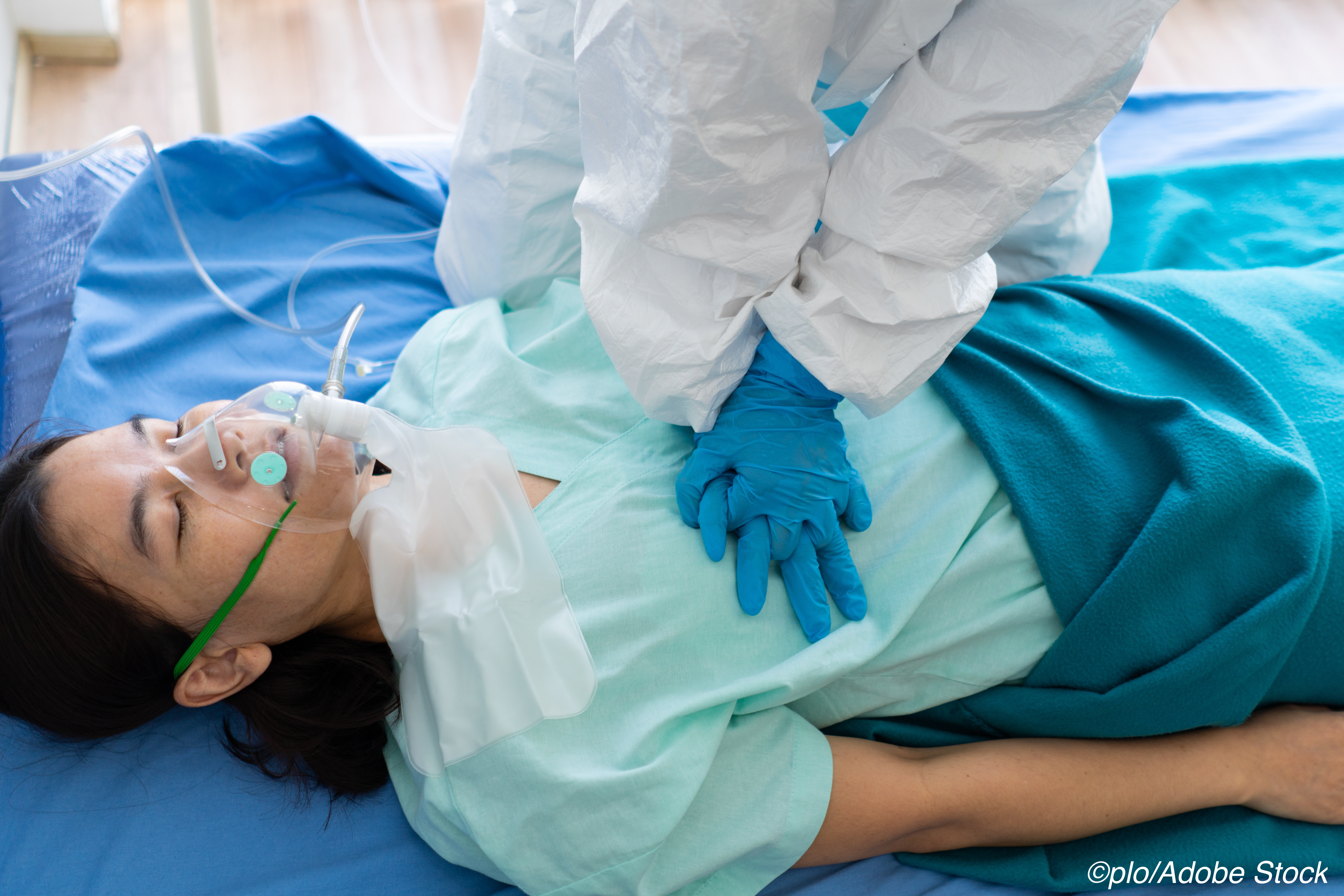 SARS-CoV-2 infection worsened survival rates for patients with cardiac arrest who received cardiopulmonary resuscitation (CPR) while in the hospital, a case series suggested.
SARS-CoV-2 infection worsened survival rates for patients with cardiac arrest who received cardiopulmonary resuscitation (CPR) while in the hospital, a case series suggested.
Of 54 hospitalized Covid-19 patients who had in-hospital arrest, 0% survived until discharge and 96% had a nonshockable rhythm, reported Corey Mayer, DO, of William Beaumont Hospital in Royal Oak, Michigan, and coauthors, in JAMA Internal Medicine. Median CPR duration was 10 minutes.
Before the Covid-19 pandemic, a review concluded that 20 to 25% of patients with in-hospital cardiac arrest survived until discharge, and 81% had a nonshockable rhythm (asystole or pulseless electrical activity).
“These outcomes warrant further investigation into the risks and benefits of performing prolonged CPR in this subset of patients, especially because the resuscitation process generates aerosols that may place health care personnel at a higher risk of contracting the virus,” Mayer and colleagues wrote. “Further studies in this area would be beneficial and potentially aid in informing CPR guidelines for this patient population.”
Improving outcomes for Covid-19 patients who have in-hospital cardiac arrest “will be challenging, as few of the likely drivers of poor outcomes (e.g., nonshockable rhythms, respiratory etiologies of arrest, and underlying critical illness) are modifiable,” noted J. Randall Curtis, MD, MPH, of the University of Washington in Seattle, and coauthors in an accompanying editorial.
“While these early results should not warrant universal do-not-attempt-resuscitation (DNAR) orders for patients with Covid-19, they highlight the importance of conducting goals-of-care discussions early during the course of Covid-19 and revisiting those discussions with changes in clinical status (worsening or improvement),” Curtis and colleagues wrote. “Moreover, the existing data may warrant clinician recommendations for DNAR, particularly in patients with severe respiratory failure who are at high risk of in-hospital cardiac arrest.”
Outcomes of in-hospital cardiac arrest requiring CPR are affected by most patients having a critical illness at the time of arrest and a substantial number of patients with nonshockable initial rhythms, which are associated with worse outcomes. Additional factors present with SARS-CoV-2 infection include a presumed respiratory etiology of arrest, lack of effective therapy for the underlying viral infection, delay because of isolation procedures, limited availability of advanced life support resources, and increased risk of viral transmission.
Outcomes after CPR are important in assessing the appropriateness of resuscitative efforts and to guide professional policy, but limited evidence exists for cardiac arrest in hospitalized patients with Covid-19. An early study in Wuhan, China of 136 Covid-19 patients with in-hospital cardiac arrest found about 94% had reported nonshockable rhythms. The primary outcome, return of spontaneous circulation, was achieved in 13.2%, and 30-day survival was 2.9%.
In this study, Mayer and colleagues studied patients admitted to Beaumont Hospital between March 15 and April 3. Of 1,309 patients with a Covid-19 diagnosis, they identified adults who had CPR for cardiac arrest, excluding those with do-not-resuscitate orders or who were receiving comfort care or hospice care.
Of 54 patients in the study, about 39% were female and median age was 61.5. About 67% were Black, 20% were white, and 3.7% were Asian. Hypertension (78%), diabetes, (56%), and hyperlipidemia (50%) were common. Median body mass index was 33.
Overall, 53.7% achieved the primary outcome of return of spontaneous circulation in median time of 4 minutes. By initial rhythm, the cohort showed:
- Pulseless electrical activity in 81.5%; return of spontaneous circulation in 54.6%.
- Asystole in 14.8%; return of spontaneous circulation in 62.5%.
- Pulseless ventricular tachycardia in 3.7%; return of spontaneous circulation in 0%.
Ventricular fibrillation was not seen. “Despite 29 patients (53.7%) achieving return of spontaneous circulation, none survived to discharge,” the researchers noted.
“Outcomes in the setting of Covid-19 may not actually differ from pre-Covid-19 outcomes of in-hospital cardiac arrest for patients with nonshockable rhythms, for whom hospital survival is often less than 15%,” the editorialists observed.
“Although this study was not designed to examine racial disparities, it is notable that two-thirds of the patients were Black,” they continued. “In the context of Covid-19, Black persons and persons of color are more likely to contract Covid-19 or develop serious illness requiring hospitalization; this association is most likely because of disparities. As such, the urgency of eliminating racial disparities in health care has never been clearer.”
A shared focus on promoting early goals-of-care discussions should be a priority, they suggested, recommending The Conversation Project and PREPARE For Your Care to give patients and families Covid-specific guidance.
Limitations of the case series include early, limited data about a new infectious disease and small sample size.
-
SARS-CoV-2 infection worsened survival rates for patients with cardiac arrest who received in-hospital CPR, a case series suggested.
-
Of 54 hospitalized Covid-19 patients who had in-hospital arrest, 0% survived until discharge and 96% had a non-shockable rhythm.
Paul Smyth, MD, Contributing Writer, BreakingMED™
The authors reported no conflicts of interest.
Curtis reported grants from the National Institutes of Health, Cambia Health Foundation, and National Palliative Care Research Center outside the submitted work.
Cat ID: 501
Topic ID: 498,501,254,930,501,791,932,570,730,933,358,190,926,192,927,151,928,925,934

